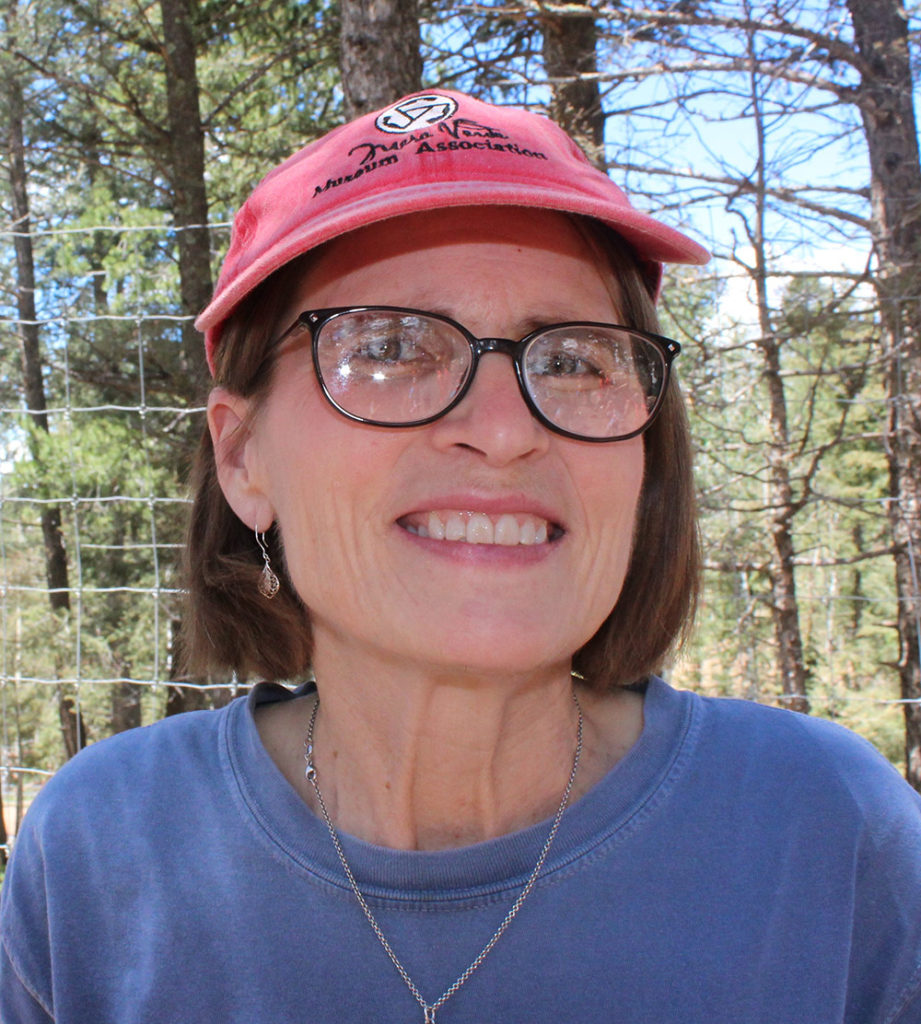 PAMBE Ghana Board Member Barb Reid The door to adventure swung wide open for Barb Reid when, as an undergrad at Texas A&M, she declared her major to be Wildlife and Fishing Science. “I have always had this passion for nature,” explains the long time PAMBE Ghana board member. “And there’s a bit of an adventurer in me, too.” These qualities have taken Barb all over the world, living in really tough conditions, doing difficult jobs with minimal support, and relying on her own resourcefulness.
Early on she was in Alaska as the biologist onboard a commercial fishing vessel, responsible for ensuring compliance with the fishing laws. Some of her work involved observing shipboard activities, but she also worked with the catch, identifying species and taking biological measurements. “It was a fascinating job!” recalls Barb.
She stayed in Alaska to do fieldwork with the Bowhead Whale Project out of Barrow, located 300 miles north of the Arctic Circle. Barb did aerial survey work her first year, flying in a small plane 500 feet above the ground. Her second year was land-based, during the Arctic summer. She camped on an ice pack, collecting data that helped determine how many of this endangered species the native people could harvest. “We’d take a snowmobile from camp to our survey point,” said Barb. “It was light 24 hours, but it was cold: 32 felt warm. We’d work 6 days a week, 24/7, on 4 hours then sleep 4 hours. We’d even use the same sleeping bag!” On day 7 she’d go to town, bathe and sleep in a bed.
Eventually Barb moved south, completing a Masters in Conservation Education at Texas A&M, and then joining the Peace Corps. Barb’s assignment was in the remote villages of Guatemala’s Cuchumante Mountains. “The first time we hiked up from the main town it took us about four hours. We got so we could do it in two.” Her job was to help with reforestation after illegal logging left the slopes bare and topsoil eroding. “We set up tree nurseries in each of the villages and worked with the farmers,” she said. “I’d teach them agricultural techniques like terracing and planting along the contour of the slope.” Although Barb speaks Spanish, she needed a translator to communicate. The villagers were indigenous Mayans who spoke Mam. “It was in Guatemala that I learned what it was like to be a teacher in a remote location,” says Barb.
Barb’s experiences don’t end there. She was in the Crisis Corps responding to a devastating hurricane in the Dominican Republic. She married another adventurer and Peace Corps alum, Steve Reid (who had worked in Northern Ghana), and the couple taught school in Madagascar for two years. She taught elementary school in Oklahoma City’s dual language program at Wheeler Elementary. And she worked at World Neighbors, where she met Peter Gubbels and his, wife, Alice.
Alice was just completing her degree at Oklahoma City University. PAMBE Ghana didn’t yet exist, but Barb felt a kinship with Alice. A few years later, Barb joined PAMBE Ghana’s board. “I was just thrilled,” she remembered. “I would actually like to be out there working in Ghana, but being involved here is the next best thing.” Barb continues, “I think I have something to contribute, having lived in the Third World. I know what it’s like for those teachers to teach, and what reality is in such a place, no matter where. We all have similar stories.”
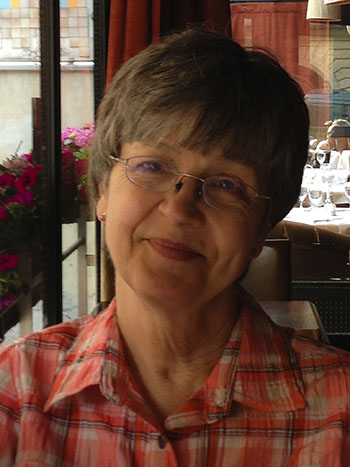 Suzanne Parker has been a loyal PAMBE Ghana volunteer for many years. She brings knowledge of Africa and years of teaching experience to the organization. As a young child she loved school and read about Africa, dreaming to go there one day. Her dreams came true! Suzanne Parker has been a loyal PAMBE Ghana volunteer for many years. She brings knowledge of Africa and years of teaching experience to the organization. As a young child she loved school and read about Africa, dreaming to go there one day. Her dreams came true!
Suzanne and husband Bill (PAMBE Ghana board member) lived in the Ivory Coast, where she taught at the International School.
After 42 years of teaching Suzanne retired. She increased her time helping at the PAMBE Ghana Global Market and recently organized a group of volunteers to select and catalog nearly 2000 books to be shipped to La’Angum Learning Center.
I met with Suzanne and asked about her background and history with PAMBE Ghana.
When did you become involved with PAMBE Ghana?
I met Alice when she came to Westminster School to apply for a teaching position in the French Department. The director of the lower school, Cathy Waldo, interviewed Alice and introduced her to me. Cathy knew that Alice and I had something in common; I had been in West Africa and spoke French. I was on a break at the time, so we spent some time together and got to know each other.
Cathy and I were impressed by Alice and agreed that we needed to find a place for her at the school. Although Alice didn’t get the teaching position, Cathy offered her a job as a second grade assistant.
Because of our background working together at Westminster, Alice invited me to an early group meeting at her house. We all spent the time brainstorming about her dream to open a school in northern Ghana.
It seems that Alice’s work at Westminster School strongly influenced her dream of starting a school.
It became obvious immediately that Alice had a talent with children, although she hadn’t worked with young children. She had planned a school for older children, but I suggested that she start with young children and see how it worked out.
As she worked with the second graders, she began to see how starting with young children would be the best, particularly when teaching a second language.
What is your teaching background?
After obtaining my degrees, I taught for 42 years all over the world, including Paris and Abidjan, Ivory Coast. In Abidjan, I taught at the International School. I always taught the young children; they are so fun! When I taught, I tried to implement the Montessori philosophy in every class.
What took you to these exotic places?
My husband, Bill, worked for a non-governmental organization, the Institute for Cultural Affairs. His job took us many places.
How have you been involved with PAMBE Ghana over the years?
My volunteer activities have been primarily with the Global Market, working at the store or helping with ordering of products. After I retired, I had more time to devote to volunteer work and the store. I try to work in the store at least 2 times a week during the season and help with other things when needed. Lately, I have been working on PAMBE Ghana’s book project.
And, when Alice comes back to OKC we sit and talk, teacher- to- teacher, about what education should look like in Africa. We talk about how you can teach the Montessori method using things that can be found in Africa.
How do you feel about the success of La’Angum Learning Center?
I feel proud and amazed, but sad that I can’t be there.
Have you thought about visiting?
I visited Ghana several times when we lived in the Ivory Coast. However, traveling is harder and harder these days. We did things when we lived there that we couldn’t do today!
What do you remember about Ghana?
The people were so lovely in Ghana and the Ivory Coast, as well. I assumed that the people would be speaking in English in Ghana, but quickly found out that Ghana has many tribal languages.
Thank you, Suzanne, for your service to PAMBE Ghana over the past ten years!
We value your ideas, expertise and commitment, which contributes to the success of La’Angum Learning Center.
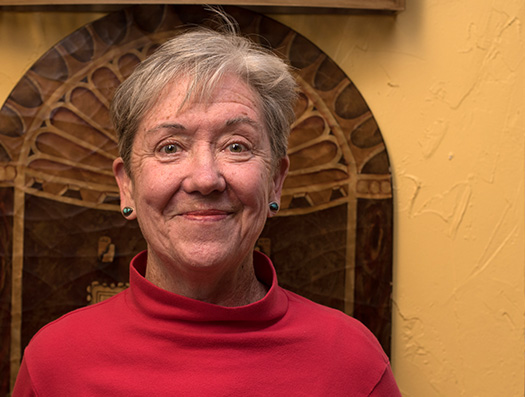
Diane Parker brings her considerable experience, persistence and dry wit to PAMBE Ghana. She has been working with PAMBE Ghana since the early days, recruiting her sister, Mary Ann Johnson, to volunteer at the Global Market. Recently, I talked with Diane about her life and work. — Jane Wheeler
JW: I know that you work in the Global Market, but also volunteer in other ways. What keeps you coming back?
DP: I like the “expressive” volunteer activities: telling everyone I can about the Global Market. I wanted to get the word out to businesses on Classen Boulevard, so I drove around collecting addresses, following up with cards and posters advertising the Global Market. It gave me a chance to spread the word.
JW: Have I ever asked you to be on the Public Relations and Marketing Committee?
DP: Yes and I told you no.
JW: You have been involved with PAMBE Ghana from the beginning. Were you in the Temple’s living room with the group that encouraged Alice to make her dream happen?
DP: I was there from the beginning, but not in the Temple’s living room that time. I wonder where I was? I knew Alice personally, but didn’t know about PAMBE Ghana’s birthing until it was born. And I knew Patti Tepper-Rasmussen and Linda Temple from the World Neighbors days, so it was natural for me to join the group of volunteers working to make the dream a reality.
JW: Are you from OKC originally?
DP: Oklahoma City is my hometown. After graduating from Harding, I attended OU. While I was in college, I got the travel bug and spent my summers working in projects in San Francisco, Roxbury, MA and Yellowstone. After OU, I got a job teaching in Oakland, California. Being young, I didn’t know how to set boundries, so I got overwhelmed and in too deep. It seem like a good time to vacate the premises, so I bummed around Europe for a year.
JW: Only a year?
DP: Well, Mom called: “Would you come home for your sister’s wedding and stay awhile?” So I did.
JW: What path did you follow when you came back?
DP: The city hired me to work with Roosevelt (“Rozie”)Turner. We created the Mayor’s Action Youth Organization (MAYO), a program for disadvantaged youths. I continued this work with the City of Oklahoma City, the Community Action Program and the YWCA/Job Corps from 1968 until 1974.
JW: Where did you meet your husband, Charles Parker?
DP: Charles was working as an investigator in the Legal Aid office, which was across the street from our office. He would come over and flirt with all the girls. He was looking for a new wife, so I took the job. After we became a couple in 1970, I convinced Charles to go back to school. This took us to Miami, Florida, where he studied industrial arts.
JW: What adventures did you find in Florida?
DP: We both taught school. I worked at a vocational school in Homestead teaching migrants at night. I had a wonderful time! One girl couldn’t read at all, so I taught myself phonics and taught her how to read. That was really rewarding.
The plastic frantic lifestyle in Florida drove me to graduate school looking for some kindred spirits, so I went to Florida International University. There, I got a masters’ degree in public administration.
Then, the Department of Defense hired Charles to teach in the base schools in Germany. We got married so I could go overseas with him. When our son, David, was old enough to go to school, I applied for a position as budget analyst with the Army. We were there for 15 years until the Berlin Wall fell. Charles’ school closed and I transferred to Tinker, AFB.
After 30 years, I retired. It seemed like the right time.
JW: Besides PAMBE Ghana, what are you passionate about now?
DP: I like to learn by reading and taking classes. Recently, I attended a class on neuroplasticity, learning that we have a lot of choice as to what goes into the mind.
I love to laugh, exercise, and listen to live music. And, travel, of course! Mary Ann and I went to Hannibal, Missouri recently. We learned all things Mark Twain.
I am not ADD, but I do have ants in my pants.
JW: We love to laugh with you, Diane! Thanks for sharing a bit of your life with me today.
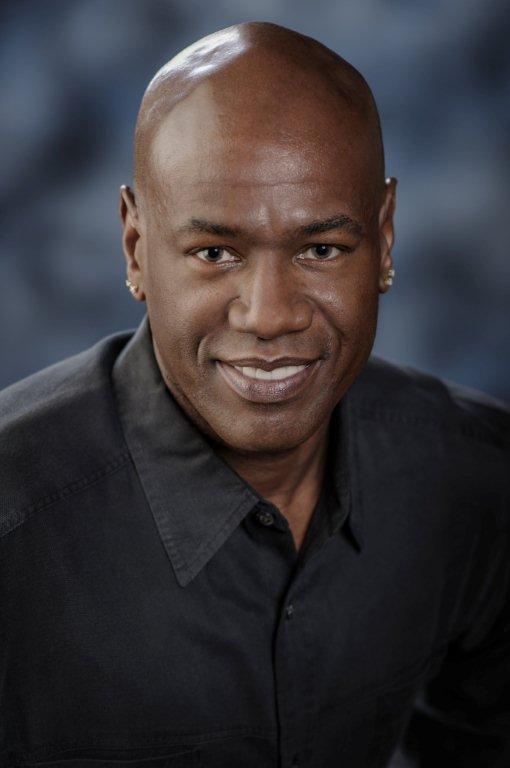 Don Oliver Two years ago, when The Men’s Corner first appeared in the Global Market, creator Don Oliver was excited and apprehensive. This was a new level of participation for the long time PAMBE Ghana supporter who has a history of creative involvement in the community.
Don first heard of PAMBE Ghana through board member Jane Wheeler, who works out at the gym he owns: Don’s DO Fitness at 5118 N Shartel. She was looking for a performance venue for the African singer and dancer Kaberic, who was making promotional appearances throughout OKC on behalf of PAMBE Ghana a few years back. Anyone who knows Don knows he can’t say no to dance. Or to music. And if he can learn something in the process, he’s there. And if he can also be altruistic? He’s right in front of you. Don opened his spacious and bright exercise room to a crowd of all ages, and thus began this warm and rewarding partnership.
Don is one of the world’s creative people. He says he’s always been a dancer. He taught dance throughout his high school years in Guthrie, OK, and during his college years at the University of Central Oklahoma. At his gym, he incorporates dance moves into his step classes. Don has a strong sense of design, which he tapped to create the industrially chic space for his fitness center. He’s also a musician, playing drums in club gigs with bands. But then he picked up the harmonica.
“I started playing straight harp, which is when you’re playing the exact notes of the song,” explained Don. “A friend said I should learn cross harp, when you play a note that is harmonically balanced with another note: Four steps above the key of the band.” Don never looked back. “I hear it and I feel it,” he said. “You’re flying between the guitarist and vocals. You can move in between them or back them up or mimic them – you can do anything. It’s a blast.”
Don still plays the occasional band gig. He also loves to go out dancing (you can catch him out on the floor somewhere on most weekends). But he puts a lot into his business and into his community, donating his time to PAMBE Ghana and other nonprofits. “I’ve always been taught to make the world a better place,” says Don. “Whether it’s volunteering or running my business or doing a job, if people feel good about themselves, this just goes out into the world.”
For the Men’s Corner, Don spends hours shopping fair trade suppliers for the right products. Before the Global Market opens each year, he sets up the space to spotlight the products he feels will appeal to men. Don is picky, as a volunteer who works with him will attest! But he’s got a job to do and the experience and skills to do it with. And he’s the first to let loose with a big laugh. Because life is joyful. And Don Oliver is full of life.
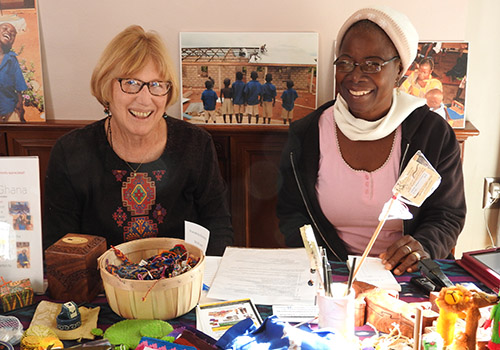
You could say that PAMBE Ghana started at the Temple’s home. One Friday night, at “soup night,” Alice talked to the friends gathered about her dream of going back home to start a school. They’d heard it before. However, this time they pushed her forward. In the gentle but firm manner of good friends, they said, “Alice, do something about it or quit talking about it!”
That did it. Alice put a group together and they created PAMBE Ghana. Linda offered to do a global fair trade market for PAMBE Ghana nine years ago. Her volunteering commitment to PG continues as strong as ever.
Linda still brings a wealth of talent and experience to our organization. She coordinates the Global Market, including overseeing the buying of merchandise from Fair Trade organizations and training of volunteers. Linda also serves on the Public Relations and Marketing committee of PAMBE Ghana.
Linda has worked with Fair Trade since the 1980’s. She developed a strong interest after she heard Sister Leona Leucke from the Peace House speak to the local weavers guild about her work with weavers in Guatemala. The weavers were widows and mothers selling their work to support their families. After the inspiring talk, Linda and Anne Murray started buying yardages and selling them at coffee shops, churches, and parties in homes. They collected $200 from local weavers to get started with the project.
After a couple of years, Anne and Linda visited the project in Santa Apolonia, Guatemala. It was a dangerous trip because of the brutal civil war ongoing at the time. Looking back, Linda wondered if the trip was the best idea, but explained it by saying, “The things you do in your youth! “
When they returned, they kept selling until everyone they knew had as much Guatemalan stuff as they could use or give away. So, they expanded to a “Market Day” concept. They got Oklahoma State non-profit status and bought through Fair Trade groups, which had developed in the decade since they first heard Sister Leucke. They used the proceeds to benefit different groups, such as a school in Nepal and artisans in Haiti. And they always sent something back to Guatemala.
Linda and Anne went on to help World Neighbors with their Fair Trade gift shop, coordinating and keeping it stocked and organized. Eventually, Linda worked for World Neighbors in their publications department, while still doing the shop. She and PG Board Member Patti Tepper-Rasmussen, did the purchasing for their annual “World Fest Market.” When World Neighbors decided they no longer needed their help, they shifted energies and converted it to the PAMBE Ghana Global Market.
Linda’s drive to help others is a value instilled in her by her parents. Her parents were activists, taking up for the rights of others and taking care of those in need. As a high school student, she witnessed these values in action, as her parents, especially her mother, became more involved in civil rights and feminist issues during the 1960s. They also fostered many children over the years.
After graduation from Muskogee High School, in 1964, Linda attended OCU on an academic scholarship. She was an elementary education major, which was selected for her by the administration. After student teaching, she realized that she didn’t want teaching as a career path. “Student teaching should come at the first, rather than the end of school,” Linda said.
Linda met Tom, her husband, at OCU, and the pair moved to New York City for a couple of years to work with the Catholic Workers Movement. Linda also worked as a secretary for the vocational rehabilitation unit at Harlem Hospital. After leaving New York, they moved to Peabody, Kansas, where she worked for the local paper. Linda remembers, ”I got to do everything at the paper from running the printers to photographing for the stories.”
However, events caused Linda and Tom to grow up fast. When they were 25, Linda’s mother died leaving two young brothers, ages 8 and 11. They came to live with the young couple. It was time to settle down and provide for the kids. Linda ran a day care center and Tom went back to school.
They eventually moved back to Oklahoma City so Tom could work on solar energy projects with architect Jon Robison. Linda started work as a secretary at Red Rock Behavioral Health Services and worked her way up to the Director of Administration. Although working at Red Rock was very rewarding, Linda wanted to diversify her resume, so she got a job as the Director of Development at the Oklahoma Foundation for Excellence. Later, she worked in the publications department of World Neighbors and at OU, where she was assigned to work in technical writing at the Department of Human Services.
After that, she was able to go to Library School at OU, earning a Master’s degree and fulfilling a childhood dream. After completing her degree, she worked for the Oklahoma City County Metropolitan Library in Midwest City.
Linda gives her time and talents to PAMBE Ghana and other worthwhile projects, including editing a quarterly textile newsletter for Weave A Real Piece (WARP).
Additionally, Linda is a Master Gardener and spends a lot of time in her yard, especially propagating native plants. She still identifies herself as a weaver, although these days she mostly only does tablet weaving bands. She and her husband Tom enjoy traveling and are frequent tent campers and hikers. They travel to London a couple of times a year to spend time with their son, Blaise, his wife Melissa, Nicola, 9, and Quinn, 7.
PAMBE Ghana is just one organization that has benefited by Linda’s boundless commitment to help others make their way in the world. Thank you, Linda!
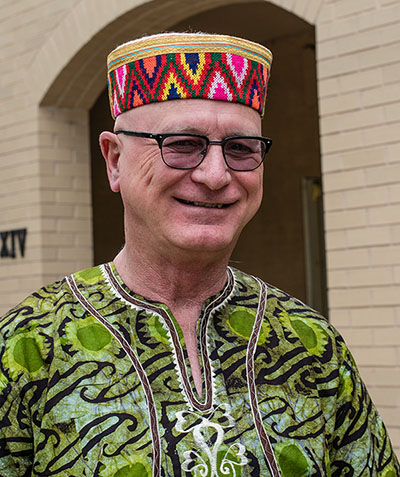 One of the best things to happen to PAMBE Ghana in 2009 was that Richard Williamson, CPA became Treasurer. He has helped us navigate the tricky waters of international exchange rates, which can wreak havoc on our dollar-based budgets. He’s guided us through salary issues tied to Ghana’s high inflation rate. He prepares our 990 tax returns and heads our very prudent budgeting process. And he’s done this all as a volunteer. One of the best things to happen to PAMBE Ghana in 2009 was that Richard Williamson, CPA became Treasurer. He has helped us navigate the tricky waters of international exchange rates, which can wreak havoc on our dollar-based budgets. He’s guided us through salary issues tied to Ghana’s high inflation rate. He prepares our 990 tax returns and heads our very prudent budgeting process. And he’s done this all as a volunteer.
Richard’s day job is with the American Cancer Society’s probate and trust department. “The planned giving people get donors to put us in their wills and trusts. I’m at the end of the process, when we’re collecting the money people have left to us.” This familiarity with the nonprofit environment has been one of Richard’s contributions. Before his ten years at American Cancer Society, Richard spent ten years as the chief financial officer at the beloved Oklahoma-based nonprofit, World Neighbors.
“I met Alice through this, because her husband Peter and I worked in the same office for about six years,” recalled Richard. “Peter introduced me to PAMBE Ghana because they needed someone to help.” Richard wasn’t sure at first if the small organization would survive financially. Today, he is pleased with what we’ve accomplished. “It shows what a person can do if they want to, “ he said. “A lot has been accomplished by Alice’s determination. Somehow she finds a way.”
But some of the behind the scenes, non-sexy things that Richard does help. He insists that PAMBE Ghana budgets a year out – so we raise money in year 1 for year 2. The money we’re spending this year is already in the bank; the money we’re raising today is for next year. “I’ve seen both large and small nonprofits go out of business the other way,” says Richard. “If you’re fundraising to make current expenses you’re always on thin ice.”
Before moving into the nonprofit sector, Richard’s world was oil and gas – for 20 years. He was born in a small Oklahoma town, got his BA and MBA from OU then, after four years in the army, he got his CPA. For nearly the next twenty he worked in the oil and gas business. The first several years in the 1970’s were boom times, when oil and gas was a fun business. But the last years in the 1980’s were the worst the industry has even had. Jobs dried up as companies folded. Richard got a job with a trucking company where he prepared bids for contracts. He had to figure out how to make the low paid workers work harder and faster so that the company would make more money. This experience led Richard to think about what would really satisfy him. That’s when he moved to nonprofit.
He explained that in accounting, the actual job that you’re doing is the same from place to place, but in the nonprofit setting, the mission of what you’re doing is much more satisfying. “You work there because you believe in what they’re doing.” But when the work you’re supporting is in the third world, you are removed from actually seeing the fruit of your labors. Richard has had the good fortune to see first hand some of his results. He’s traveled to Central America twice and Africa three times. This last trip, to Ghana in 2015, was to see PAMBE Ghana’s La’Angum Learning Center.
These trips, to see how the money is being used, make all the difference in the world in understanding what is actually being accomplished. Richard explains, “There is always some skepticism about how the money is being used, and if it’s getting where it needs to go. When you travel overseas and actually see the school building, that there are kids running around smiling and happy, staff members, outfitted classrooms – you get to see what the money is being used for, and you can report back to your donors. Most donors don’t have this opportunity, but we can go, and report back to them.”
Richard has always worked for what he believes in, and helped build strong foundations for new endeavors. As a soccer dad, he was central to building the soccer fields west of Hefner Parkway. He was literally in charge of getting the fields ready for their first season. That meant getting a sprinkler system installed. And grass. But before that, picking up rocks. The site was covered with rocks that had to go before any other work could occur.
Most recently he helped his wife Susan build her retirement dream – a nonprofit duplicate bridge club that welcomes and teaches beginners. With Richard’s help, she opened Fun and Games Duplicate Bridge Club earlier this year at OKC’s Northpark Mall. “We call it our lake house,” jokes Richard, “because instead of a lake house, we have a bridge club!” Richard and Susan’s youngest son, Stuart, a software developer and his wife Kristin, Director of Children’s Services for the Metropolitan Library System (and PAMBE Ghana supporters) went with him to Ghana to visit the school last summer. Their oldest son, Clint, and his wife Natalie, are both radiologists with Integris Hospital. The Williamson’s have six grandchildren.
Rachel Apple first heard about PAMBE Ghana three years ago while leaning over a cocktail table at a Ronald McDonald House gala, sharing getting-to-know-you stories with a fellow attendee. “It sounded like important work and it was the right time in my life. I figured I’d like to help,” said the Renaissance woman in her mid-twenties.
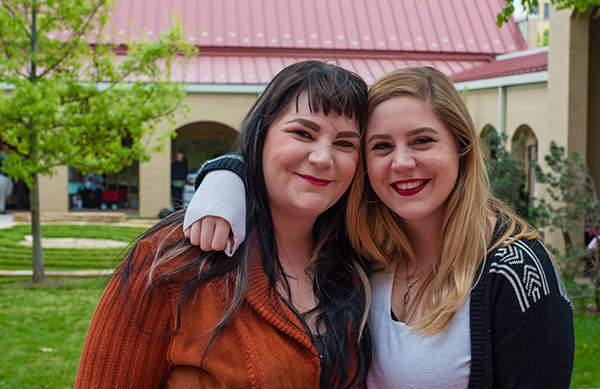 Rachel (l) with her sister, Rylee, at the PAMBE Ghana Fest Thus began a wonderful relationship between Rachel and PAMBE Ghana. Well, Rachel and almost everyone she came in contact with. She’s a giving sort of person who doesn’t do things half way. Rachel started volunteering at the Global Market that fall, and brought several friends in as volunteers, as well. When we needed a photographer to document a fundraiser, she volunteered her services – she’d majored in photography and had a business doing photo gigs ranging from weddings to food spreads for magazines. She also proved a terrific bartender at the first PAMBE Ghana Fest, along with best friend Drew Apple, whom she married in 2011. And she helped launch our social media efforts. “I grew up in a church. It’s natural for me to do fellowship through service. When the Moore tornado hit, it wasn’t even a question of whether I would volunteer – it was ‘Where’s the volunteer center?’”
Eventually Rachel joined the PAMBE Ghana board. Although she didn’t know much about education or Africa, she contributed an important perspective and voice, as well as knowledge and experience. “I’d never been on a board and I didn’t know a lot about education or Africa. But if I felt I could contribute, I just did. I wasn’t brought up to be a warm body. If I’m doing something, I want to really be there – I want to engage.”
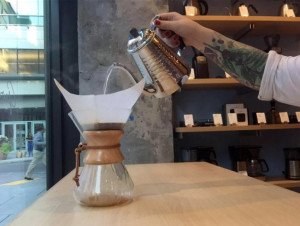 Rachel grew up in Edmond, OK and attended the Kansas City Art Institute before finishing her BFA at the University of Oklahoma with minors in ceramics and art history to go along with her photography major. But when asked about her passions, Rachel added fiber arts (“Lots of the women in my family are talented fiber artists.”), pets (“We have two dogs and two cats.”), family (“My family is the greatest!”), tattoos (“Which one?”), food and coffee (“Since 2014 I’ve started to move into coffee as a career”). Rachel grew up in Edmond, OK and attended the Kansas City Art Institute before finishing her BFA at the University of Oklahoma with minors in ceramics and art history to go along with her photography major. But when asked about her passions, Rachel added fiber arts (“Lots of the women in my family are talented fiber artists.”), pets (“We have two dogs and two cats.”), family (“My family is the greatest!”), tattoos (“Which one?”), food and coffee (“Since 2014 I’ve started to move into coffee as a career”).
True to form, Rachel parlayed an entry-level position at OKC’s Elemental Coffee into the role of Chief Roaster. She started with a high level of knowledge from past work in the field, but took it to another level. Today she is the coffee educator at George Howell Coffee in Boston. “I host classes, cuppings, education, palate trainings, brew method classes – all sorts of things.”
Being in Boston is a permanent move for Rachel and Drew, one which opens up many wonderful professional opportunities for both. And while Rachel won’t be available to assist PAMBE Ghana on a regular basis, her contributions have made a significant impact. As for Rachel, she says she, too, has benefitted from her three years of volunteering with PAMBE Ghana. “I’m grateful. I learned a lot, I got the chance to help, I got to know some wonderful people, and the experience has set me up to contribute somewhere in depth in the future.” Thank you Rachel – we wish you well!
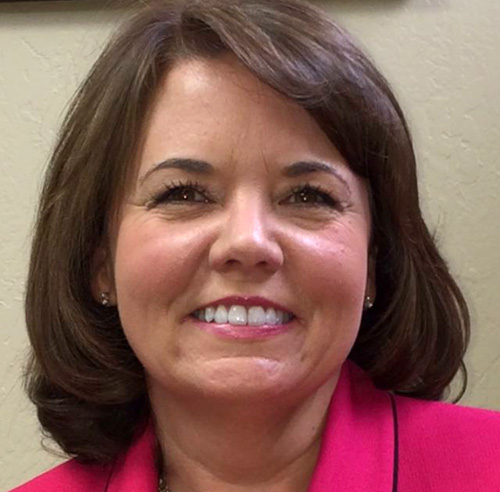 Kelly Pearson Kelly Pearson, longtime supporter of PAMBE Ghana, recently spoke with Judy Federa and Jane Wheeler about her work with PAMBE Ghana and other organizations as a “professional volunteer.” An Oklahoma City native, Kelly and her husband Paul have two children, Emily and Evan, still at home and two adult children. When Emily came along, Kelly decided to get out of the 8-5 rat race in order to spend more time with Evan and Emily. This gave her more time to volunteer in the community and put her strongly-held beliefs about “giving back” into action.
Judy & Jane: How did you first become involved with PAMBE Ghana?
Kelly Pearson: Emily was in Alice’s class at Westminster School. We were looking forward to Evan being in her class the next year, but were surprised when Alice notified us that summer that she wasn’t coming back for the fall session. However, the reason was intriguing: she wanted to go back to Ghana and start a school.
Nicole Bondurant (former PAMBE Ghana Board Member) and I decided to help with her project. We made a pact: we were going to jump in just to get our feet wet. PAMBE Ghana offered us the chance to do things that we hadn’t done before.
J & J: How did your work evolve?
KP: We had a family meeting and decided that we wanted to consistently support PAMBE Ghana. After we decided on an amount, we committed to an annual donation for 3 years. Then, 3 years turned into 4. Then, I was asked to join the board. I’d never done any fundraising, but started just doing it. I didn’t have any experience in retail either, but I decided to volunteer full time at the Global Market so it could be open in Midtown during the weekdays. The family supported PAMBE Ghana too; Paul set up tables at events and Emily continues to volunteer at the Global Market. My older daughter, Kiley helped design the PAMBE Ghana logo and helped with the newsletters and graphic design for many years. At the time, I was only working with PAMBE Ghana, but later I started working on the the Edgemere School Project, devoting half-time to each project. Later, I found I was working mostly on Edgemere School, so I decided to resign from the PAMBE Ghana Board to work exclusively with Edgemere School.
J & J: Why did you decide to contribute so much to PAMBE Ghana?
KP: One reason was our kids. They both have an ancestral connection to Ghana. We wanted to show that even though they are being raised by white parents, we acknowledge their background and culture.
J & J, What has it been like to start at the first of the project and then see it mature?
KP: When you start a project and it grows, you see the real benefits. With PAMBE Ghana it was the benefits to the children. It means that all the time spent went to good purpose. The best part of volunteering is seeing something grow. I don’t want to waste the time I have on the planet. I want to be useful.
I feel it is important to spend some time giving back. Some people give dollars; I give me. It is rewarding to work toward a goal along with like- minded people.
J & J: What are some things you are proud of or things you learned?
KP: I am proud of getting Heritage Hall involved. It was really more Emily than me. Emily was studying celebrations in first grade. She asked her teacher, Delaine Evans, if she could bring Alice to talk about the Fire Festival. The teacher was quite happy to have Alice come. Mrs. Evans got very excited and suggested that they start doing the annual first grade art show as a fundraiser for PAMBE Ghana.
Another thing was working with the Bricktown Rotary. We went to give a presentation and didn’t know what to expect, but immediately afterwards, a woman walked up and gave us a $100 check in memory of her mother. She gave us a check every time we came. Their involvement has continued throughout the years and they have even partnered with the Rotary in Ghana.
During my volunteer time with PAMBE Ghana, I learned so much about fundraising, public relations and retail by just jumping in with both feet and learning along the way!
|
Donate Today
Your Donation Today Will Help PAMBE Ghana Provide:
-- Teacher's salary
-- Children’s health insurance
-- Montessori materials
-- Teacher education
PAMBE Ghana is a 501(c)(3)
registered charitable organization.
|

 Suzanne Parker has been a loyal PAMBE Ghana volunteer for many years. She brings knowledge of Africa and years of teaching experience to the organization. As a young child she loved school and read about Africa, dreaming to go there one day. Her dreams came true!
Suzanne Parker has been a loyal PAMBE Ghana volunteer for many years. She brings knowledge of Africa and years of teaching experience to the organization. As a young child she loved school and read about Africa, dreaming to go there one day. Her dreams came true!


 One of the best things to happen to PAMBE Ghana in 2009 was that Richard Williamson, CPA became Treasurer. He has helped us navigate the tricky waters of international exchange rates, which can wreak havoc on our dollar-based budgets. He’s guided us through salary issues tied to Ghana’s high inflation rate. He prepares our 990 tax returns and heads our very prudent budgeting process. And he’s done this all as a volunteer.
One of the best things to happen to PAMBE Ghana in 2009 was that Richard Williamson, CPA became Treasurer. He has helped us navigate the tricky waters of international exchange rates, which can wreak havoc on our dollar-based budgets. He’s guided us through salary issues tied to Ghana’s high inflation rate. He prepares our 990 tax returns and heads our very prudent budgeting process. And he’s done this all as a volunteer.
 Rachel grew up in Edmond, OK and attended the Kansas City Art Institute before finishing her BFA at the University of Oklahoma with minors in ceramics and art history to go along with her photography major. But when asked about her passions, Rachel added fiber arts (“Lots of the women in my family are talented fiber artists.”), pets (“We have two dogs and two cats.”), family (“My family is the greatest!”), tattoos (“Which one?”), food and coffee (“Since 2014 I’ve started to move into coffee as a career”).
Rachel grew up in Edmond, OK and attended the Kansas City Art Institute before finishing her BFA at the University of Oklahoma with minors in ceramics and art history to go along with her photography major. But when asked about her passions, Rachel added fiber arts (“Lots of the women in my family are talented fiber artists.”), pets (“We have two dogs and two cats.”), family (“My family is the greatest!”), tattoos (“Which one?”), food and coffee (“Since 2014 I’ve started to move into coffee as a career”).
